#shin ha-kyun
Photo







Sympathy for Mr. Vengeance
2002 | dir. Park Chan-wook
#sympathy for mr vengeance#filmedit#park chan wook#song kang-ho#shin ha-kyun#bae doona#han bo-bae#im ji-eun#cinematography#films#movies#faceless
1K notes
·
View notes
Text



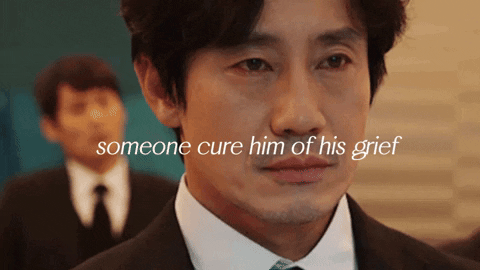



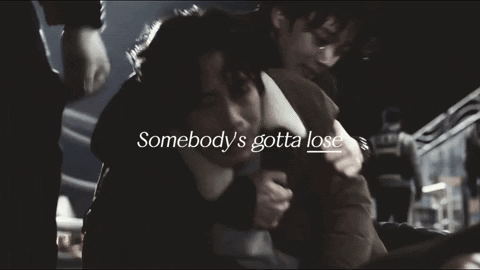
"And my Love is no good
Against the fortress that it made of you
Love is running deep.
The Sorrow that you keep."
#beyond evil#han joo-won#lee dong-sik#lee dongsik#han joowon#shin hakyun#shin ha-kyun#yeo jingoo#yeo jin-goo#yeo jin goo#shin ha kyun#jwds#jusik#queen of peace#dongsik#juwon#joowon#made by me
145 notes
·
View notes
Photo
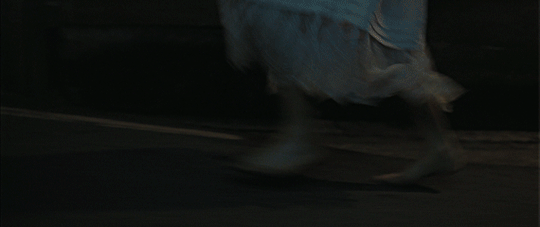
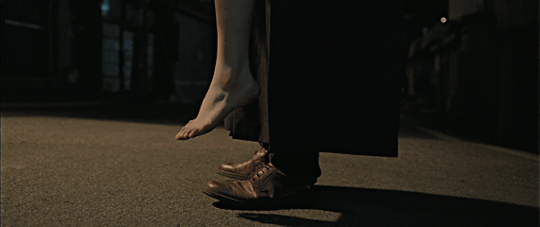

Thirst (2009)
Dir. Park Chan-wook
#Thirst 2009#Thirst#Bakjwi#Bakjwi 2009#Park Chan-wook#Park Chan wook#Chan-wook#Chan wook#Song Kang-ho#Song Kang ho#Sang-hyun#Priest Sang-hyun#Kim Ok-vin#Kim Hae-sook#Shin Ha-kyun#Kang-woo#Lady ra
797 notes
·
View notes
Text
youtube
I watched Beyond Evil, then immediately started a rewatch and this vid. I hope you enjoy it, even though it is rather full of pain.
🎵 Pomme - Ceux qui rêvent
⌛ 1:59
🌎 Original lyrics or my English translation (see settings)
💔 Lee Dong-sik is Not Okay
✨ Shin Ha-kyun's acting
🔗 On AO3 for download & commenting
#vids#fanvid#edits#beyond evil#lee dong-sik#shin ha-kyun#angst#character study#naye vids#my vids#Youtube
30 notes
·
View notes
Text
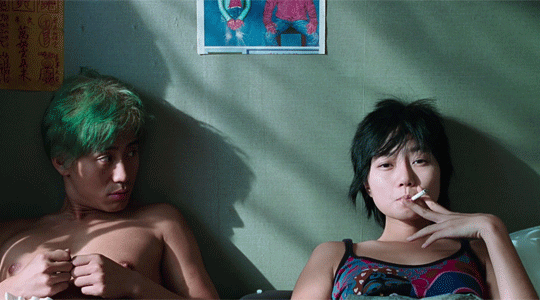
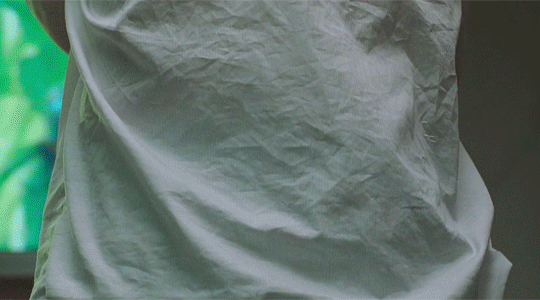
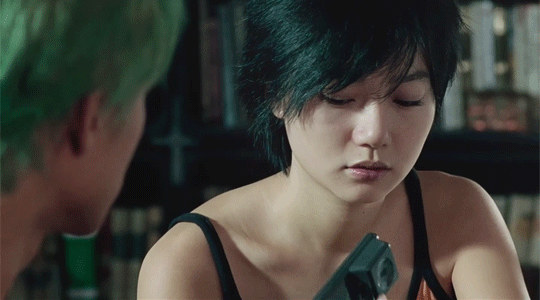



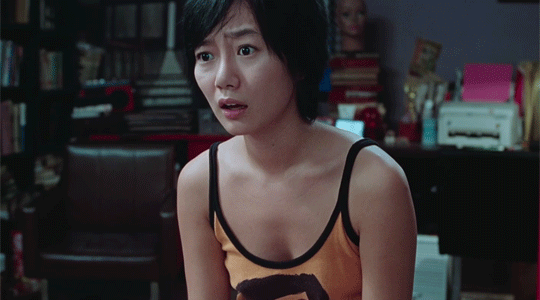

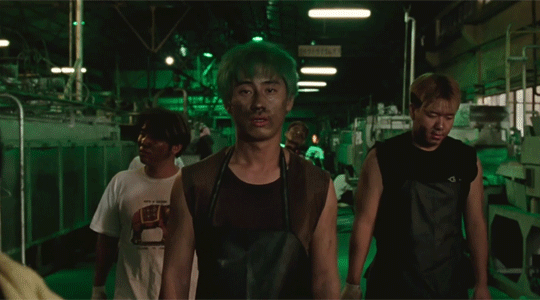
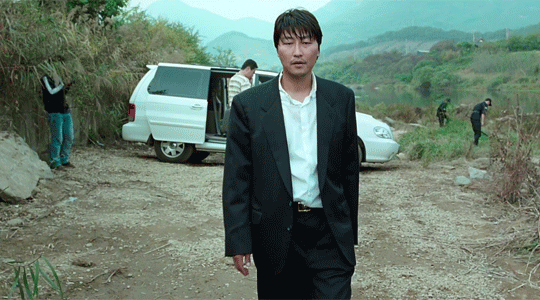
Sympathy for Mr. Vengeance
복수는 나의 것 (2002)
#Sympathy for Mr. Vengeance#복수는 나의 것#Song Kang-ho#Shin Ha-kyun#Bae Doona#송강호#신하균#배두나#Park Chan-wook#박찬욱#South Korea#movie#gif#2002
15 notes
·
View notes
Text
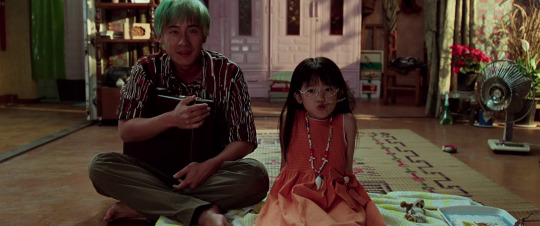
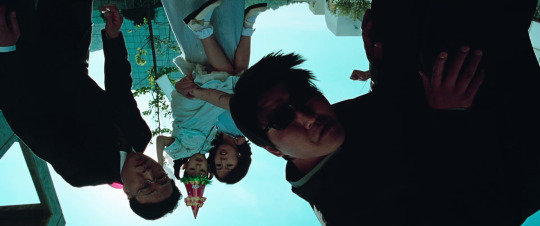



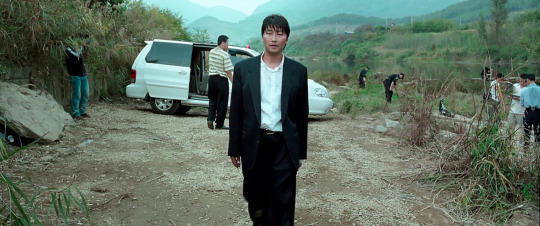

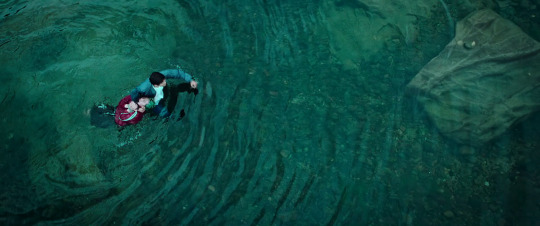

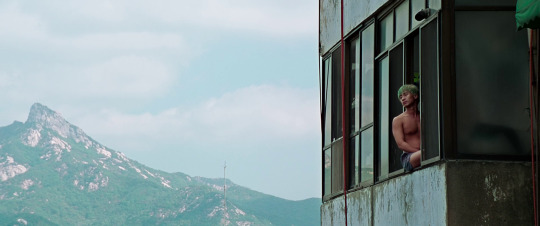
복수는 나의 것 // Sympathy for Mr. Vengeance (2002)
#Sympathy for Mr. Vengeance#Boksuneun naui geot#Park Chan-wook#cinema#Shin Ha-kyun#Song Kang-ho#Bae Doona#korea#2000s
8 notes
·
View notes
Photo

52 notes
·
View notes
Text
Joint Security Area [공동경비구역 JSA] (2000)

A picture really does say a thousand words. The final image of Park Chan-wook’s DMZ character study perfectly sums up the relationship between its four central characters as well as the overall tone that it sets in examining the human consequences of such a specific and thoroughly enforced piece of diplomatic work. The monochrome photograph captures Sgt Oh’s wry expression, Pvt Jeong grinning as he marches in the background, Pvt Nam against the wall and Sgt Lee moving to block the lens. There’s an irreverence hiding in plain sight here, a secret pact which Park teases out over the course of this military thriller. But even more brilliantly, the taking of the image itself served as a character beat earlier in the film. While it’s not the first time we meet Sgt Oh, this is his first true reveal, making the choice to hand a tourist’s hat which has blown over into the DPRK back over to the ROK. He’s stiff and militaristic, but capable of making humanistic gestures, we see here. Throughout the rest of the film, he is perhaps the levelest mind in the room. Though fervent in his dedication to the DPRK in his words, Oh seems to value the lives of those he cares about more when things get tense. He uses this zealotry to purposefully, perhaps, sabotage a cross-examination when Lee looks about to break and perhaps damage his future, and as we come to learn about the confrontation which sparked the investigation and film, Oh works to protect his brethren on the southern side of the border even after his comrade is shot. He’s a good man. They’re all good men, on some level. The central idyll is like a warm blanket were it not for the knowledge that this is doomed to fail violently, nightly gatherings of camaraderie. But we come as an audience to enjoy their time together goofing off and swapping cigarettes and stories. It’s a connection not seen anywhere else in this world of strict and arbitrary ceremony and custom. Even the woman investigating the incident, Swiss negotiator Maj Jean, is separated from her intimate connections, her father’s past as a North Korean general weaponized and herself distant from him. Everything is defined by this line in the sand, and yet four men found a way to step across it. If only for a moment. Neither Lee nor Nam escape the fallout, and Oh can only find the release of discharge. It’s a moment in time, a snapshot.
Director Park uses flashbacks and perspective to spool out the different potential truths at hand before revealing the full facts of the matter. It’s well-executed, but not exactly anything novel. What is more interesting is his effortless as usual command of visual storytelling through editing and motifs. Borders are at once very important and completely frivolous, as exemplified by the concrete band defining the split between the two territories. ROK soldiers line up in drills to shoot moving targets from a model version of this setup, but those same soldiers from both sides will in other instances line up to swap cigarettes and hunt rabbit in a whole different kind of war-game. Our secret friends become increasingly juvenile during their duties, early on making threats about shadows crossing the border, which escalates to a spitting contest. They can’t even maintain a straight face when on duty facing off against one another, which makes their later face-to-face encounter at deposition, when there can be no falsehood, all the more heartbreaking. Later, mulling her options, Jean walks back and forth on that line like it’s a tightrope, balancing geopolitical consequences. Park is never twee or kumbahyah, we should all just get along about it: klaxons warn of imminent invasion and the ROK border defense react, our central quartet mull the consequences of invasion and how they would have to shoot each other in such a scenario. He's not naive, but Park does arch his brow at the theatrics of it all.
Underneath all of this is a heavy layer of queer subtext. It’s almost full-on text, just have an orgy! The one thing holding this film back. Nothing’s perfect. But there’s a definite longing between these four, especially Nam and Jeong. The secrecy of night can hide these normal interactions which the outer world condemns. Further overtures are made and blissfully received as Nam witnesses a mirror being flashed from across the border and practically exits this plane of existence. Jeong enjoys the arts and receives his birthday gift rhapsodically. Coded messages—the passing of a Yankee lighter, whistling—take the place of conventional conversation. The memento of the landmine fuse intertwines intimacy of that first meeting with danger, a Very Queer Thing. Nam paints a dark line under his eye akin to Oh’s scar in homage to him. That’s right, I’m going full tinfoil here, this will DEFINITELY fit into my Grand Unified Gay Theory come hell or high water.
THE RULES
SIP
Someone says 'Commie' or 'bullet'.
A car with a diplomat flag on its hood appears in a scene.
Someone names a nation.
BIG DRINK
A flashback begins.
CGI(?) birds? Are birds real?
Song Kang-ho whistles.
#drinking games#jsa#park chan-wook#song kang-ho#lee young-ae#lee byung-hun#shin ha-kyun#kim tae-woo#korean cinema#drama#joint security area
6 notes
·
View notes
Text
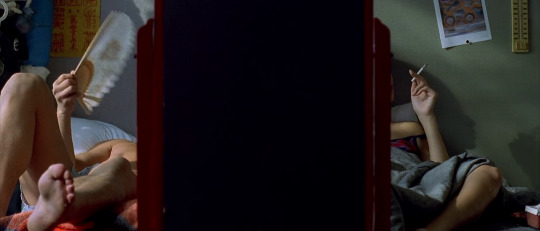

6 notes
·
View notes
Text
BLOGTOBER 10/12/2022: THIRST (2009)
As I have a healthy respect for Park Chan-wook, I was embarrassed to realize that I couldn't really remember very much about this movie. Even when I've found his movies less successful emotionally or narratively speaking, they usually leave a stamp with their images and atmosphere. In my attempt to rectify the gap I had with THIRST, I remembered that there is just something about the whole movie and its motivations that eludes me. This may or may not be my fault.

Park Chan-wook's adaptation of the oft-adapted Emile Zola novel Thérèse Raquin, which he wrote for the screen with frequent collaborator Jeong Seo-kyeong, concerns a Catholic priest whose drive toward martyrdom accidentally renders him a vampire. Beset by ennui, Sang-hyun (the great Song Kang-ho) subverts his suicidal impulses into a more noble-sounding act of self-sacrifice, participating in an experimental vaccine test for the treatment of an Ebola-like virus. This nearly kills him, but he suddenly revives when he receives a blood transfusion—and thereafter he learns with horror that he has to keep drinking blood to continue staving off the virus. Though Sang-hyun feeds only on comatose hospital patients to avoid terrorizing or killing anyone, this doesn't totally cure him of his guilt, and he feels worse still when his "miraculous" recovery makes him into an involuntary faith healer with a powerful psychosomatic effect on his congregation. One of his new "patients" is an old friend, Kang-woo (Shin Ha-kyun), who lives with his overbearing mother Mrs. Ra (Kim Hae-sook) and his wife, the sullen, seductive Tae-ju. Soon, Tae-ju tells Sang-hyun that she was adopted as an orphan by Mrs. Ra, and she has been treated like a slave by the family all her life—especially by the sickly and feeble-minded Kang-woo, who does all sorts of perverted, sadistic things to her. With Sang-hyun and Tae-ju's inevitable affair comes the revelation that he is a vampire, and when Tae-ju witnesses his supernatural strength, she convinces him to kill her husband. The traumatic experience of the murder weakens the couple's bond, and Sang-hyun tries to resolve this by turning Tae-ju into a vampire, but this changes her into a remorseless monster—though perhaps she already was, as it turns out Kang-woo had never victimized her at all.

So that's a mouthful right there. On the one hand, THIRST is a familiar story about the moral conflicts of the vampire, wherein the monster clings to his humanity by "rescuing" his lover from her torment, and feeding in what he considers to be the least harmful way. There, Catholicism is leveraged to emphasize the guilt felt by the sinful creature that was once a man. On the other hand, we have a tawdry melodrama about a pair of selfish lovers who sacrifice another person to their forbidden affair, only to realize that their relationship can't bear the weight of their crime. There are connective threads throughout the piece: Intermittently, someone opines bluntly that suicidal ideation and ambitions of martyrdom are essentially the same. Occasionally, characters debate each other about whether an afterlife is possible, or whether death is the end. In the beginning, Sang-hyun notes the psychosomatic reactions of the faithful who beg him for healings, and then after the murder, he and Tae-ju struggle to convince themselves that the mocking apparition of Kang-woo that ruins their sex life is all in their minds. However, repetition of ideas doesn't always equal coherence, and I'm not sure all of these various philosophical musings really add up to a unified statement about anything.
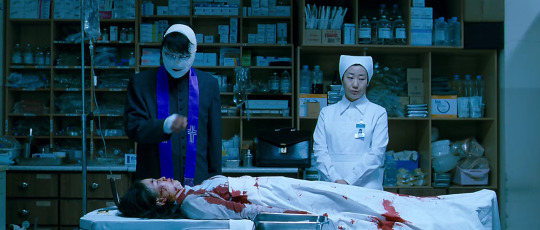
While these diverse themes compete for dominance, the most consistent thing about THIRST is that it is intensely repulsive. In a way, this is refreshing for the vampire subgenre, which is so often sexy and elegant. Diseased blisters, peeling fingernails, bloody vomit, gnarly acts of flagellation, the snot-smeared Kang-woo sweating and farting and humping air, and even Sang-hyun's relatively sanitary method of feeding all make for an extremely queasy two hours and thirteen minutes. Sure there's a lot of steamy sex in the middle, but somehow, this tends to make the experience all the more noxious. Maybe that's part of the director's point—that we're supposed to participate in Sang-hyun's guilt (however wavering that guilt may be), that moral revulsion is the main mood here. But still, it was hard for this viewer to determine who she is meant to care about, and what she's supposed to hope will happen to them. Sang-hyun is a pious fop and a hypocrite who condemns others for their suicidal thoughts, while using the loophole of martyrdom to justify his own self-destructive urges. Tae-ju is at once infantile, and also cold and cruel, which we forgive when we think she's being abused—though that delusion is soon dispelled, and we're just left wondering what her problem is.

The Zola novel on which this is based met with disgust upon its debut, being called "putrid" by one prominent critic, so maybe all this ickiness is an appropriate way to honor the source material. Still, I'm not sure what Park Chan-wook is driving at, if THIRST isn't just a grand demonstration of abject cynicism. The moral conflict that he explores so deftly in his Vengeance trilogy seems to be replaced here by pure disillusionment. Familial love is rotten and incestuous, romantic love is just selfish ego-stroking, self-sacrifice is an act of vanity, and the body that gives and gets orgasms also produces pus, blood, mucus, and gas, while taking sustenance from the suffering of other living creatures. Sure, the movie is beautiful and inventive visually, aided by great performances from the ensemble, but I'm not sure what it ultimately wants from me. It's funny, sometimes when I see a movie that is populated by unlikable cretins and fueled by misanthropy, those things are exactly what I love about it. Other times, I can't tell what I'm supposed to get out of all that bitterness and loathing. THIRST, despite its creative pedigree, falls into the latter category.
#blogtober#blogtober 2022#horror#thirst#2009#park chan-wook#Jeong Seo-kyeong#emile zola#Thérèse Raquin#song kang-ho#Shin Ha-kyun#Kim Hae-sook#adaptation#thriller#vampire#body horror
26 notes
·
View notes
Photo

Shin Ha-kyun and Kim Young-kwang Get Black
Source: k-star-holic.blogspot.com
2 notes
·
View notes
Photo

Joint Security Area
directed by Park Chan-wook, 2000
#Joint Security Area#Park Chan-wook#movie mosaics#Song Kang-ho#Lee Byung-hun#Lee Young-ae#Shin Ha-kyun#Kim Tae-woo
16 notes
·
View notes
Text


Aww they're already in love
17 notes
·
View notes
Photo
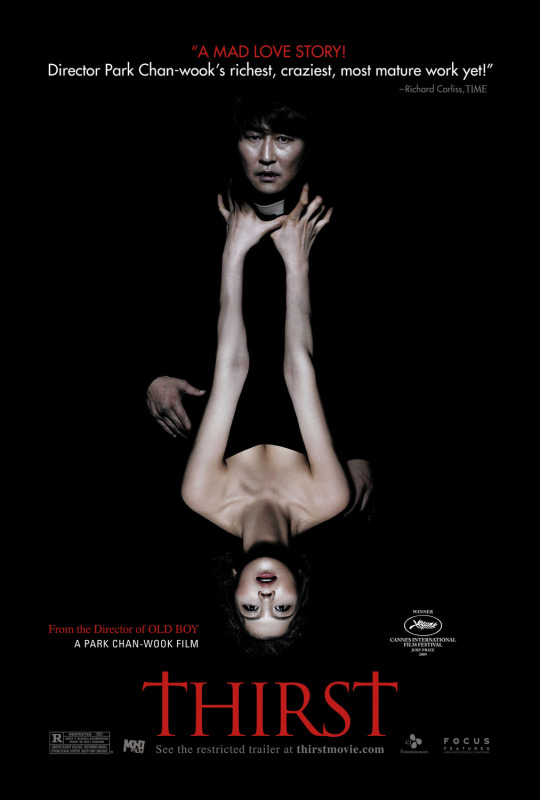
#thirst#song kang-ho#kim ok-bin#kim hae-sook#shin ha-kyun#park in-hwan#song young-chang#oh dal-su#park chan-wook#2009
2 notes
·
View notes
Text
Save the Green Planet! (2003)

I’m not going to say that someone other than the director of Save the Green Planet! should re-edit the film… but if a power outage suddenly cuts the picture 10 minutes before the end, you’ll be much more satisfied than you would if you had seen the whole thing. It’s on the cusp of being great until the conclusion undoes so much of what came before.
Byeong-gu (Shin Ha-kyun) believes pharmaceutical executive Kang Man-shik (Baek Yoon-sik) is an alien. With the help of his girlfriend (Hwang Jeong-min), Byeong-gu kidnaps him. Trapped in an underground bunker by a madman, Kang is about to be subjected to all sorts of painful procedures unless he admits “the truth”.
Writer/director Jang Joon-hwan plays the audience like a violin. He lets hope leak in through a crack and then plugs it up the moment you become convinced Kang might escape. It's a nightmare. Kang might not be the nicest person but when you see what Byeong-gu has planned for him, all of your misgivings about the businessman evaporate. The thing is, Byeong-gu is at the level of crazy that fills you with uncertainty. Maybe he’s off his rocker enough that if Kang plays into his fantasies, he’ll manage to talk himself free - perhaps by using the man’s sickly mother as a resource. Failing this, maybe Su-ni - who’s nutty herself but isn’t the ringleader in this affair - can be convinced to help her captive before it’s too late. Finally, there’s the possibility of Kang simply escaping on his own. Whatever happens, it better be soon. One look at Byeong-gu’s litteral tin-foil hat and you know the upcoming eclipse will mean this thing will come to an end one way or another.
Adding to the intrigue are a pair of detectives investigating the kidnapping. Every minute that passes feels like a hammer dropped from the ceiling. It’s only a matter of time. Someone’s going to slip up. There are simply too many things that could go wrong in this loony operation for it not to go wrong. What’s it going to be? You don’t know. When you think you’ve got it figured out, the movie pulls the rug from under you and things go from bad… to worse. You feel like you’re in that underground dungeon too, trying to figure out what you could do, what you could say to escape. I mean to allow Kang to escape. If not for him, for the others potential victims. The movie’s proven that Lee’s search for extraterrestrials is a fool’s errand. He almost gets you at one point because he’s so convinced of his mission but when you hear what the “real” history of earth is… none of it makes sense.

Then, at the end of the movie, we get a twist. Not only are the aliens real, Kang was an alien the whole time. Their king, in fact. If this film had been played a bit differently, the message might’ve been that it isn’t enough for you to be right; you also have to know how to convince others of the truth. Instead, what are we supposed to think? That it’s ok to torture and murder any number of people… as long as it’s for the right reason? Nothing the movie does will make you sympathize for Byeong-gu. He’s evil. Same for his girlfriend. AT BEST, she's merely complicit. When they get taken out, you cheer. Oh, but you’re not supposed to. His failure means Kang can blows up the planet and kill BILLIONS. To add insult to injury, the film takes the time to make you understand that Byeong-gu is a person, that he didn’t start off crazy and was driven to madness by circumstances. We see him at his worst, but the film concludes with a montage of him at his best. He had parents who loved him, he loved his dog, and his girlfriend too. So what? All the people he murdered were people too. What about them?

Although Save the Green Planet! ends on a foul note, the rest is so compelling it'd be a shame to dismiss it. While watching, you’ll be gripped in its claws and loving it. The film is terrifying and intense. You’ll be drenched with sweat and won’t want to miss a minute as the characters carefully circle each other, trying to figure out what move to make next. A remake is reportedly in the works. Let's hope it rights the mistakes Save the Green Planet! makes. (Original Korean with English subtitles, January 22, 2021)

#Save the Green Planet!#Jang Joon-hwan#Shin Ha-kyun#Baek Yoon-sik#movies#films#movie reviews#film reviews#2003 movies#2003 films
1 note
·
View note
Text
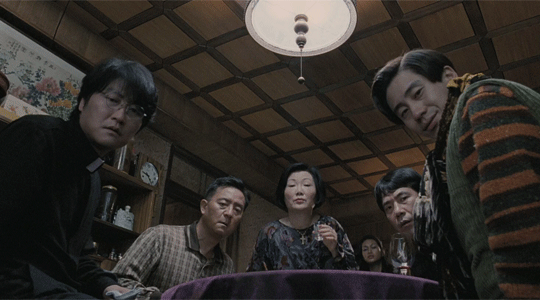
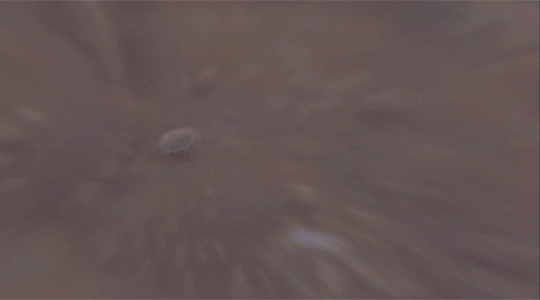

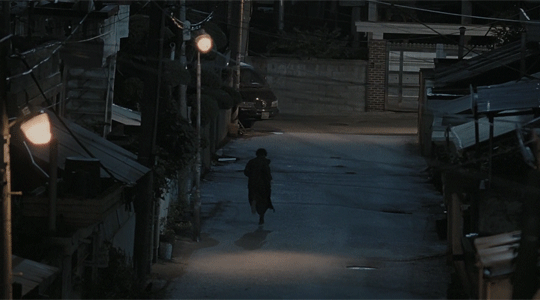

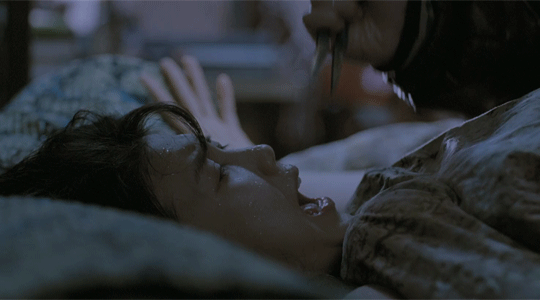
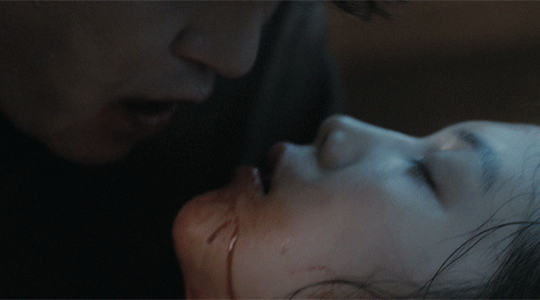



Thirst
박쥐 (2009)
#Thirst#박쥐#Song Kang-ho#Kim Ok-vin#Shin Ha-kyun#송강호#김옥빈#신하균#Park Chan-wook#박찬욱#South Korea#movie#gif#2009
0 notes